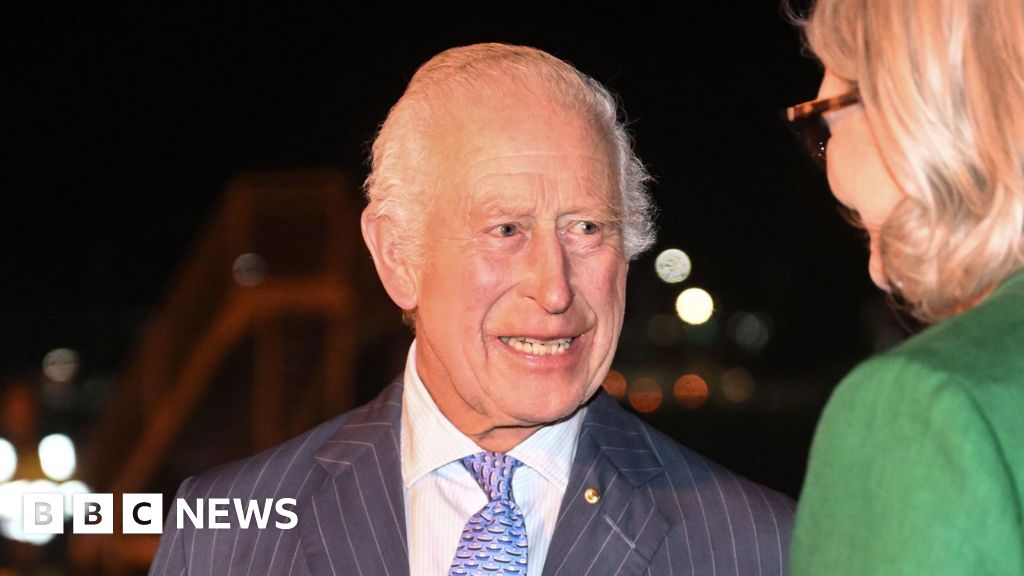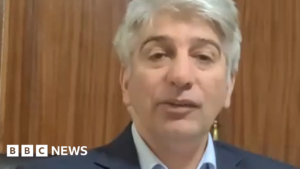No UK apology over slavery at Commonwealth summit

The government has said there will not be an apology over Britain’s role in the transatlantic slave trade, when King Charles and Sir Keir Starmer visit the Commonwealth summit in Samoa next week.
A Downing Street spokesperson had already ruled out financial reparations.
Last year, the King spoke of his “greatest sorrow and regret” at the “wrongdoings” of the colonial era on a visit to Kenya, but stopped short of an apology, which would have depended on the agreement of ministers.
The Commonwealth Heads of Government Meeting, to be held in Samoa on 25 and 26 October, will bring together the leaders of 56 countries.
Even if the issue of historic links to slavery is raised at the summit, the UK government has told the BBC there are no plans for a symbolic apology.
There had already been a rejection of reparations over slavery, but 10 Downing Street also now says there won’t be an apology either.
Instead the focus will be on current issues, a government spokesperson said, such as “shared challenges and opportunities faced by the Commonwealth, including driving growth across our economies”.
Speeches from monarchs are made on the advice of ministers. This means the King would be unable to make an apology over the UK’s links to slavery unless he had the approval of the government.
Labour MPs including Bell Ribeiro-Addy had called for the UK government to officially apologise for its participation in the slave trade.
David Lammy, as an MP on the opposition benches in 2018, had said: “As Caribbean people we are not going to forget our history. We don’t just want to hear an apology, we want reparations.”
But with Labour now in power, Downing Street has ruled out an official apology over slavery and ended speculation of any statement at the Commonwealth meeting in Samoa, which might have been the international platform for such an apology.
It means that the policy of not apologising continues from the previous government, when prime minister Rishi Sunak last year rejected the idea and said “trying to unpick our history is not the right way forward”.
Opponents of an apology have pointed to Britain’s prominent role in ending slavery, including legislation in 1807 to abolish the slave trade.
Discussions of formal apologies or reparations could still be raised by other countries, with Caribbean leaders having argued for some financial recognition of the legacy of slavery, with figures of £200bn being quoted.
The Commonwealth summit will also vote on a new secretary-general and all three of the candidates are supporters of reparations for transatlantic slavery.
It is an issue which strongly divides the public, including readers of the BBC’s Royal Watch newsletter, who got in touch by email.
“Those of us living now should not be made to feel guilty or apologise for something that had absolutely nothing to do with us,” Ruth, from the UK, said.
“We don’t like what happened, but we weren’t around then, so why should we say sorry?”
Ronald, from Bristol in the UK, took the opposite view.
“A sincere apology would acknowledge that grievance and, in my view, would go some way to assuaging the sense of injustice,” he said.
Sarah, in Ghana, said it would be “humane” of the King to deliver an apology.
“I believe it will go a long way to healing wounds caused by the slave trade,” she said.
The King and Queen Camilla arrived in Australia on Friday to begin their six-day tour of the country, which will be followed next week by the Commonwealth summit in Samoa.
#apology #slavery #Commonwealth #summit
News plays a pivotal role in our lives by keeping us informed and connected to the world. It serves as a critical source of information, offering updates on current events, politics, economics, science, and more. Through news, we gain awareness of global issues and local developments, helping us make informed decisions in our personal and professional lives. News also fosters discussion and debate, encouraging critical thinking and perspective-taking. Moreover, it promotes transparency and accountability among governments, businesses, and other institutions. In a rapidly changing world, staying updated with the news enables us to adapt to new challenges and opportunities, shaping our understanding of the complexities of society. Ultimately, news is not just about information; it empowers us to participate actively in the world around us, contributing to a more informed, engaged, and responsible global citizenry.
Health is fundamental to our well-being and quality of life, making it an essential aspect of daily existence. It encompasses physical, mental, and emotional aspects, influencing our ability to function effectively and enjoy life fully. Prioritizing health allows individuals to maintain optimal physical fitness, reducing the risk of diseases and promoting longevity. Mental health, equally crucial, affects our cognitive abilities, emotional stability, and overall happiness. Investing in preventive healthcare through exercise, balanced nutrition, and regular medical check-ups helps in early detection of potential health issues, ensuring timely intervention and treatment. Beyond individual benefits, a population’s health impacts societal productivity and economic stability. Governments and organizations worldwide emphasize public health initiatives to address pandemics, health disparities, and promote overall well-being. Ultimately, health serves as the foundation upon which we build our lives, influencing our ability to pursue goals, nurture relationships, and contribute meaningfully to society.
Money plays a crucial role in our lives as a means of financial security and freedom. It enables us to meet basic needs such as food, shelter, and healthcare, while also providing opportunities for education, travel, and personal growth. Beyond material comforts, money facilitates social connections and experiences that enrich our lives. It empowers individuals to invest in their futures, whether through savings, investments, or entrepreneurial ventures, thereby fostering economic stability and growth. However, the pursuit of wealth should also be balanced with ethical considerations, as money can influence relationships and societal dynamics. Responsible management of finances is key to achieving long-term goals and mitigating financial stress. Ultimately, while money is a tool for achieving aspirations and fulfilling desires, its true value lies in how it is utilized to improve both personal well-being and the broader community.
Earning Easy Money in 2024: Opportunities and Considerations 💸
In 2024, the landscape of earning easy money presents diverse opportunities, albeit with considerations. The digital age offers platforms for freelancing, online trading, and e-commerce, allowing individuals to leverage skills and creativity for financial gain. Cryptocurrency investments continue to allure with potential for quick profits, yet they entail high volatility and risk. Moreover, the rise of the gig economy enables flexible work arrangements through apps and websites, offering quick payouts but often without job security or benefits. Passive income streams such as rental properties and investments in stocks or bonds remain viable, but demand initial capital and ongoing management. Amid these options, caution is essential to avoid scams and unsustainable ventures promising overnight success. Ultimately, while the allure of easy money persists, informed decisions, diligence, and a long-term perspective are crucial for sustainable financial growth and security in the dynamic year ahead.





